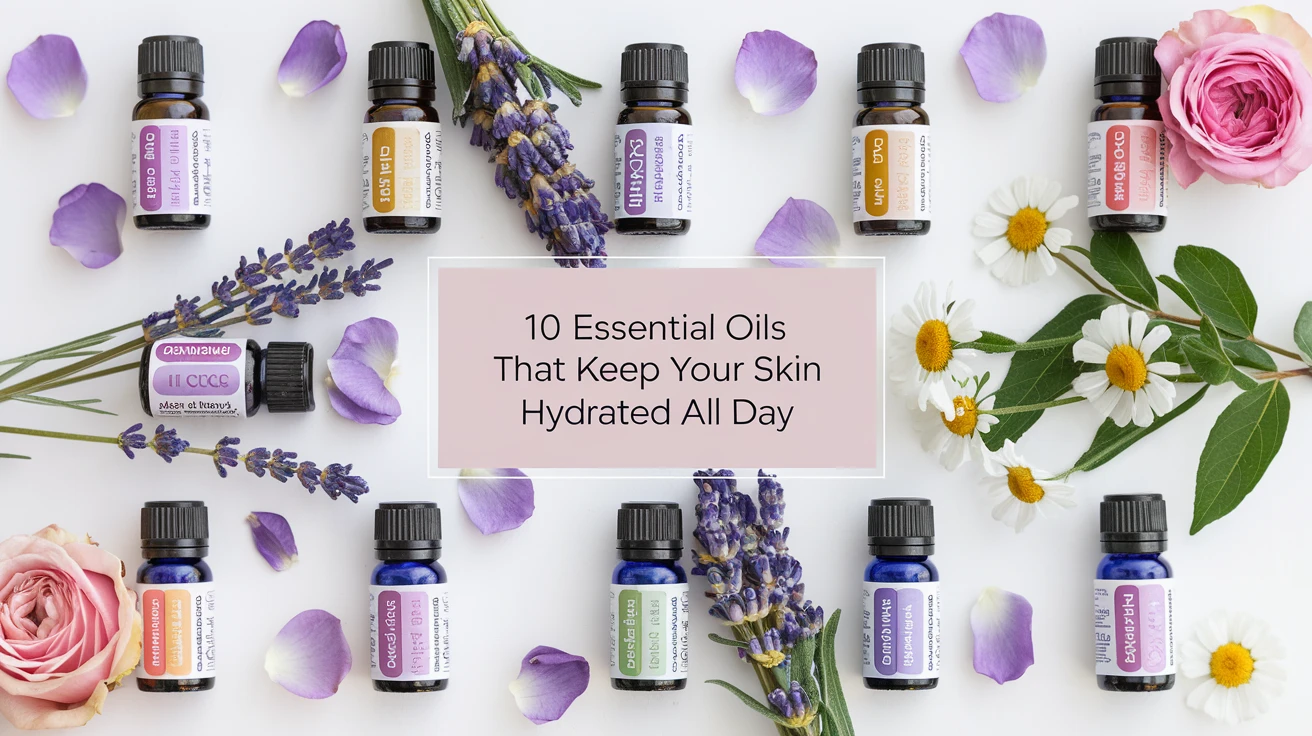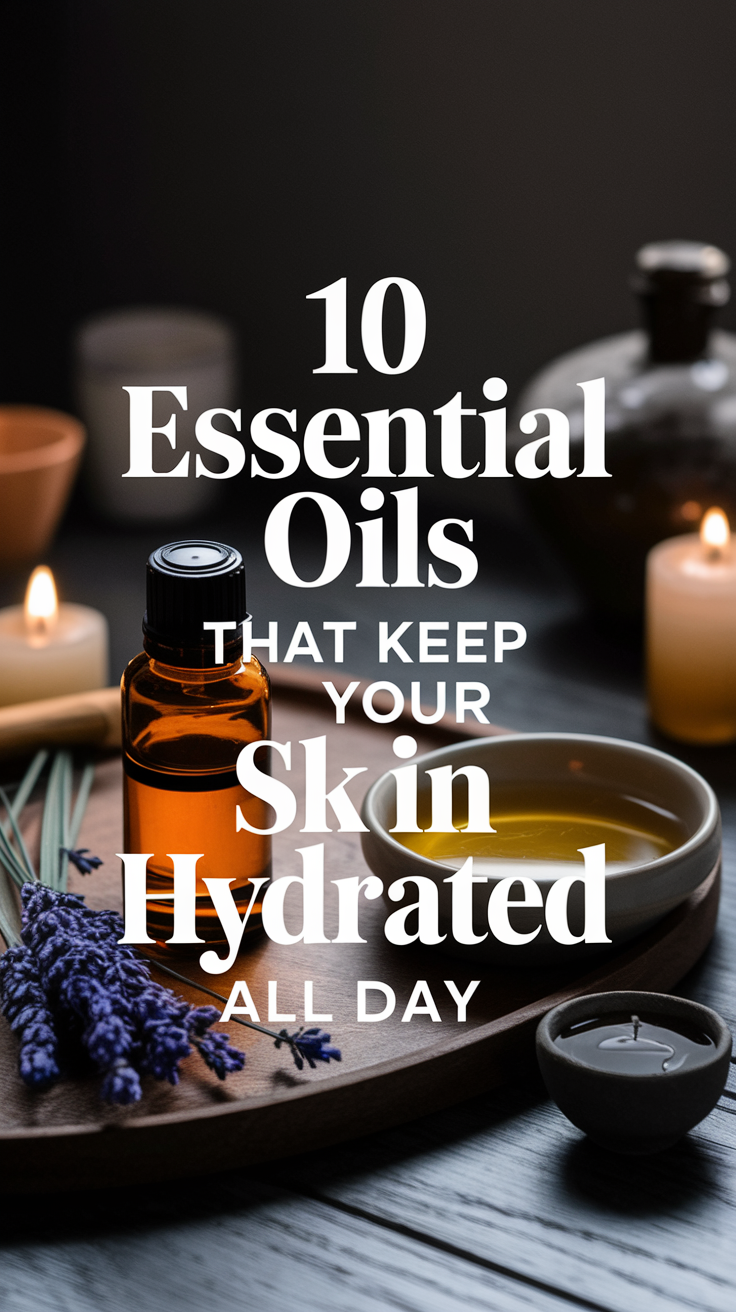
As someone who’s struggled with dry skin for years, I’ve discovered that essential oils are nature’s answer to maintaining skin hydration. These powerful plant extracts not only smell divine but also work wonders in keeping your skin moisturized throughout the day. In this comprehensive guide, I’ll share my personal experience and research about the top 10 essential oils that can transform your skincare routine and help you achieve that coveted dewy, hydrated glow.
The Science Behind Essential Oils and Skin Hydration
Essential oils are concentrated plant extracts that contain active compounds beneficial for skin health. These natural oils work in multiple ways to maintain skin hydration:
– They create a protective barrier that locks in moisture
– Help balance the skin’s natural oil production
– Contain antioxidants that protect skin cells
– Support the skin’s natural healing processes
| Mechanism | Benefit |
|---|---|
| Occlusive Properties | Creates a barrier to prevent water loss |
| Humectant Effects | Attracts and retains moisture |
| Anti-inflammatory Action | Reduces skin irritation and redness |
| Cell Regeneration | Promotes healthy skin renewal |
Essential Oil Safety Guidelines
Before diving into specific oils, let’s cover some crucial safety tips:
– Always dilute essential oils with a carrier oil
– Perform a patch test before full application
– Use high-quality, pure essential oils
– Store oils in dark glass bottles away from sunlight
– Avoid applying undiluted oils directly to skin
| Carrier Oil | Dilution Ratio | Best For |
|---|---|---|
| Jojoba Oil | 2-3 drops per tablespoon | All skin types |
| Sweet Almond Oil | 3-4 drops per tablespoon | Dry skin |
| Coconut Oil | 2-3 drops per tablespoon | Very dry skin |
10 Best Essential Oils for Skin Hydration
1. Lavender Essential Oil
– Balances natural oil production
– Promotes cell regeneration
– Soothes irritated skin
– Perfect for all skin types
2. Rose Essential Oil
– Rich in natural moisturizing properties
– Improves skin texture
– Promotes collagen production
– Ideal for mature skin
3. Geranium Essential Oil
– Regulates oil production
– Improves skin elasticity
– Reduces inflammation
– Suitable for combination skin
4. Chamomile Essential Oil
– Calms sensitive skin
– Reduces inflammation
– Promotes healing
– Excellent for sensitive skin
5. Ylang Ylang Essential Oil
– Balances sebum production
– Promotes cell renewal
– Improves skin texture
– Great for combination skin
6. Helichrysum Essential Oil
– Promotes skin regeneration
– Reduces scarring
– Deep moisturizing properties
– Perfect for damaged skin
7. Sandalwood Essential Oil
– Natural astringent properties
– Promotes cell renewal
– Long-lasting hydration
– Ideal for mature skin
8. Frankincense Essential Oil
– Promotes cell regeneration
– Reduces fine lines
– Improves skin tone
– Excellent for aging skin
9. Myrrh Essential Oil
– Deep moisturizing properties
– Promotes healing
– Reduces inflammation
– Perfect for very dry skin
10. Neroli Essential Oil
– Stimulates cell regeneration
– Improves skin elasticity
– Balances oil production
– Suitable for all skin types
Application Methods and Recipes
Here are some effective ways to incorporate these oils into your skincare routine:
1. Daily Moisturizing Blend
– 2 drops Lavender
– 2 drops Geranium
– 1 drop Rose
– 1 tablespoon Jojoba oil
2. Intensive Night Treatment
– 2 drops Frankincense
– 2 drops Myrrh
– 1 drop Sandalwood
– 1 tablespoon Sweet Almond oil
3. Sensitive Skin Blend
– 2 drops Chamomile
– 1 drop Neroli
– 1 tablespoon Calendula oil
Conclusion
Essential oils offer a natural and effective way to maintain skin hydration. By incorporating these powerful plant extracts into your skincare routine, you can achieve and maintain healthy, hydrated skin. Remember to always follow proper dilution guidelines and listen to your skin’s needs. Start with one or two oils and gradually expand your collection as you discover what works best for your skin type.
Key Takeaways
- Always dilute essential oils with appropriate carrier oils
- Choose oils based on your specific skin type and concerns
- Consistency is key in maintaining skin hydration
- Quality matters when selecting essential oils
- Patch testing is crucial before full application
Frequently Asked Questions
How often should I apply essential oils to my skin?
For best results, apply your essential oil blend once or twice daily, preferably after cleansing when your skin is slightly damp.
Can I mix multiple essential oils together?
Yes, you can create blends using 2-3 essential oils, but ensure the total dilution ratio remains appropriate for your skin sensitivity.
How long does it take to see results?
Most people notice improved skin hydration within 1-2 weeks of consistent use, though individual results may vary.
Are essential oils safe during pregnancy?
Some essential oils should be avoided during pregnancy. Always consult with a healthcare provider before using essential oils while pregnant.
Can essential oils cause allergic reactions?
Yes, which is why patch testing is crucial before using any new essential oil on your skin.
Should I use essential oils in the morning or evening?
Both times are beneficial, but evening application often allows for better absorption during sleep.
Can I use essential oils if I have sensitive skin?
Yes, but start with gentle oils like chamomile and use lower dilution ratios.
How should I store my essential oils?
Store in dark glass bottles away from direct sunlight and heat, preferably in a cool, dark place.
Can I add essential oils to my regular moisturizer?
Yes, you can add a few drops to your regular moisturizer, but ensure proper dilution ratios are maintained.
How long do essential oil blends last?
When properly stored, essential oil blends typically last 3-6 months. Always check for any changes in smell or appearance before use.


